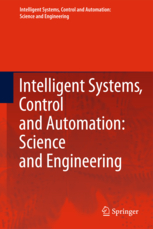Intelligent Systems, Control and Automation: Science and Engineering

Intelligent Systems, Control and Automation: Science and
Engineering, the new name for the series formerly known as
Microprocessor-Based and Intelligent Systems Engineering Bookseries,
has published around thirty books on developments in this interesting
field that borders on so many disciplines and has so many practical
applications: human-like biomechanics, humanoid robotics, intelligent
control of robotic systems, robot interaction with different kinds of
environments, automation, computer and control engineering, but also
neural networks, fuzzy logic, genetic algorithms, nonlinear dynamics
and control, and of course theoretical mechanics. This wide range of
topics, approaches, perspectives and applications is reflected in a
large readership of researchers and practioners in various fields, as
well as graduate students who want to learn more on a given subject.
As a reflection of the changing world of scientific progress, a
change in series title has been effectuated. The topic has evolved over
the years and the following title is felt to be a more accurate fit for
the current content of the books that are being published.
The current Series Editor is Professor S. G. Tzafestas, National
Technical University of Athens, Greece. He is assisted by an Editorial
Advisory Board who help to select the most interesting and cutting edge
manuscripts for the series.
Click here for further information
Terms
While we only use edited and approved content for Azthena
answers, it may on occasions provide incorrect responses.
Please confirm any data provided with the related suppliers or
authors. We do not provide medical advice, if you search for
medical information you must always consult a medical
professional before acting on any information provided.
Your questions, but not your email details will be shared with
OpenAI and retained for 30 days in accordance with their
privacy principles.
Please do not ask questions that use sensitive or confidential
information.
Read the full Terms & Conditions.